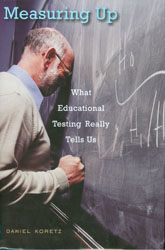
Measuring Up:
What Educational Testing Really Tells Us
By Daniel Koretz
LB3051 .K667 2008
New Book Island, 2nd floor
I wish that I had a longer name for only one reason. When I was doing the achievement tests in elementary school, I only got to fill in eight lettered circles. I was jealous of the Christophers and Elizabeths in my class because they got more of a challenge when spelling their names in bubbles. Yet, as a young student, I didn’t realize that the stakes are higher than just making a pretty design with the scantron sheets. These tests place a lot of weight on teachers and schools to ensure that students are learning ‘what they should’ and performing in line with their counterparts in other districts in their states and across the country. This week’s featured title addresses what standardized testing really does and what it means for all involved.
Koretz, education professor at Harvard, takes a hard look at educational testing and its effects on the school system. Rather than take sides, the author presents both sides of the coin by examining the strengths and weaknesses of achievement testing. He provides a background of the history of testing in the United States and analyzes the major controversies surrounding the subject, like high-stakes testing and inflated scores, cultural bias and the evaluation of aggregate scores. The work also includes references for further investigation on the topic.
